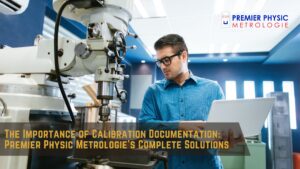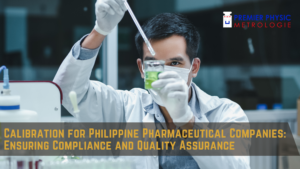Discover why The Importance of Calibration Services in Ensuring Accurate Measurements is paramount for precision in various industries. Learn how calibration services guarantee accurate results for your measurements.
Introduction
In the realm of precision and accuracy, the significance of calibration services cannot be overstated. Calibration is the process of comparing the measurements of an instrument or device against a known standard to ensure accuracy. It’s an indispensable aspect across diverse industries, including manufacturing, healthcare, aviation, and scientific research. This article delves deep into why calibration services are crucial for ensuring accurate measurements, exploring their importance, benefits, and frequently asked questions surrounding this vital process.
Understanding Calibration Services
Calibration services encompass a range of activities aimed at verifying and adjusting the performance of measurement instruments. From temperature gauges to pressure sensors and medical devices, calibration ensures that these tools provide precise and reliable data. Without proper calibration, measurements can be inaccurate, leading to flawed products, compromised safety, and financial losses.
Calibration services play a crucial role in ensuring the accuracy and reliability of measurements across various industries. From healthcare to manufacturing and beyond, precise measurements are essential for quality control, safety, and regulatory compliance.
Introduction to Calibration Services
Calibration is the process of comparing the measurements of an instrument or device to a known standard to determine its accuracy. It ensures that the instrument provides results within an acceptable range of error.
Types of Calibration Services
Calibration services can be conducted on-site, in-house, or in specialized laboratories, depending on the equipment and requirements of the organization.
Industries That Rely on Calibration Services
Industries such as healthcare, manufacturing, aerospace, and automotive heavily rely on calibration services to maintain precision in their operations.
Calibration Frequency and Standards
The frequency of calibration depends on factors such as the type of equipment, its usage, and industry standards. Adherence to international calibration standards is essential for consistency and accuracy.
The Calibration Process
The calibration process involves inspection, adjustment, and documentation of results to ensure traceability and reliability.
Risks of Neglecting Calibration
Neglecting calibration can lead to inaccurate measurements, posing safety hazards, and resulting in legal consequences for non-compliance.
Choosing a Calibration Service Provider
Selecting a reputable and accredited calibration service provider is crucial for ensuring accurate results and timely service delivery.
Emerging Trends in Calibration Services
Technological advancements have led to innovations such as remote and automated calibration processes, improving efficiency and reducing downtime.
The Significance of Regular Calibration
Regular calibration is essential to maintain the accuracy and reliability of measurement instruments over time. As instruments age or undergo environmental changes, their performance can drift, leading to deviations from the desired accuracy. By scheduling periodic calibrations, organizations can identify and rectify these deviations, ensuring consistent and trustworthy measurements.
Benefits of Calibration Services
Calibration services offer a multitude of benefits across various industries:
Enhanced Product Quality
Calibration ensures that manufacturing equipment and tools produce components and products within specified tolerances, contributing to higher quality standards and customer satisfaction.
Regulatory Compliance
Many industries are subject to stringent regulatory requirements regarding measurement accuracy. Calibration helps organizations comply with these standards, avoiding penalties and legal issues.
Cost Savings
By detecting and addressing inaccuracies early on, calibration prevents costly errors, rework, and product recalls, ultimately saving businesses time and money.
Improved Safety
In fields such as healthcare and aviation, inaccurate measurements can have life-threatening consequences. Calibration ensures the reliability of critical instruments, enhancing safety for both professionals and the public.
The Importance of Calibration Services in Ensuring Accurate Measurements
Calibration services play a pivotal role in various sectors, including:
- Manufacturing: Ensuring the precision of machinery and tools in production processes.
- Healthcare: Maintaining the accuracy of medical devices for patient diagnostics and treatment.
- Aviation: Guaranteeing the reliability of aircraft instruments and navigation systems.
- Research and Development: Providing precise measurements for scientific experiments and data analysis.
FAQs (Frequently Asked Questions)
- What is calibration? Calibration is the process of comparing the measurements of an instrument to a known standard to determine its accuracy.
- How often should equipment be calibrated? The frequency of calibration depends on factors such as the type of equipment, its usage, and industry standards.
- Can I calibrate equipment myself? While some simple equipment can be calibrated in-house, complex instruments often require professional calibration services.
- What happens if equipment isn’t calibrated? Neglecting calibration can result in inaccurate measurements, safety hazards, and legal consequences for non-compliance.
- Are calibration services expensive? The cost of calibration services varies depending on factors such as the type of equipment and the scope of calibration required.
How often should instruments be calibrated? Instruments should be calibrated at regular intervals based on factors such as usage frequency, environmental conditions, and industry regulations.
Can calibration be performed in-house? While some organizations have in-house calibration capabilities, many prefer outsourcing to accredited calibration laboratories for impartial and standardized services.
What is traceability in calibration? Traceability ensures that calibration measurements are linked to national or international standards, providing confidence in the accuracy of calibration results.
Are there portable calibration solutions available? Yes, portable calibration equipment allows for on-site calibration of instruments, reducing downtime and logistical challenges.
What qualifications should a calibration technician possess? Calibration technicians should have relevant training, certifications, and experience in metrology and instrument calibration.
How can I verify the validity of a calibration certificate? Ensure that calibration certificates are issued by accredited laboratories and include traceability information, calibration procedures, and measurement uncertainties.
Conclusion
In conclusion, calibration services are indispensable for ensuring accurate measurements across diverse industries. By maintaining the precision and reliability of measurement instruments, calibration contributes to product quality, regulatory compliance, cost savings, and safety. Organizations must prioritize regular calibration to uphold standards of accuracy and reliability in their operations.



